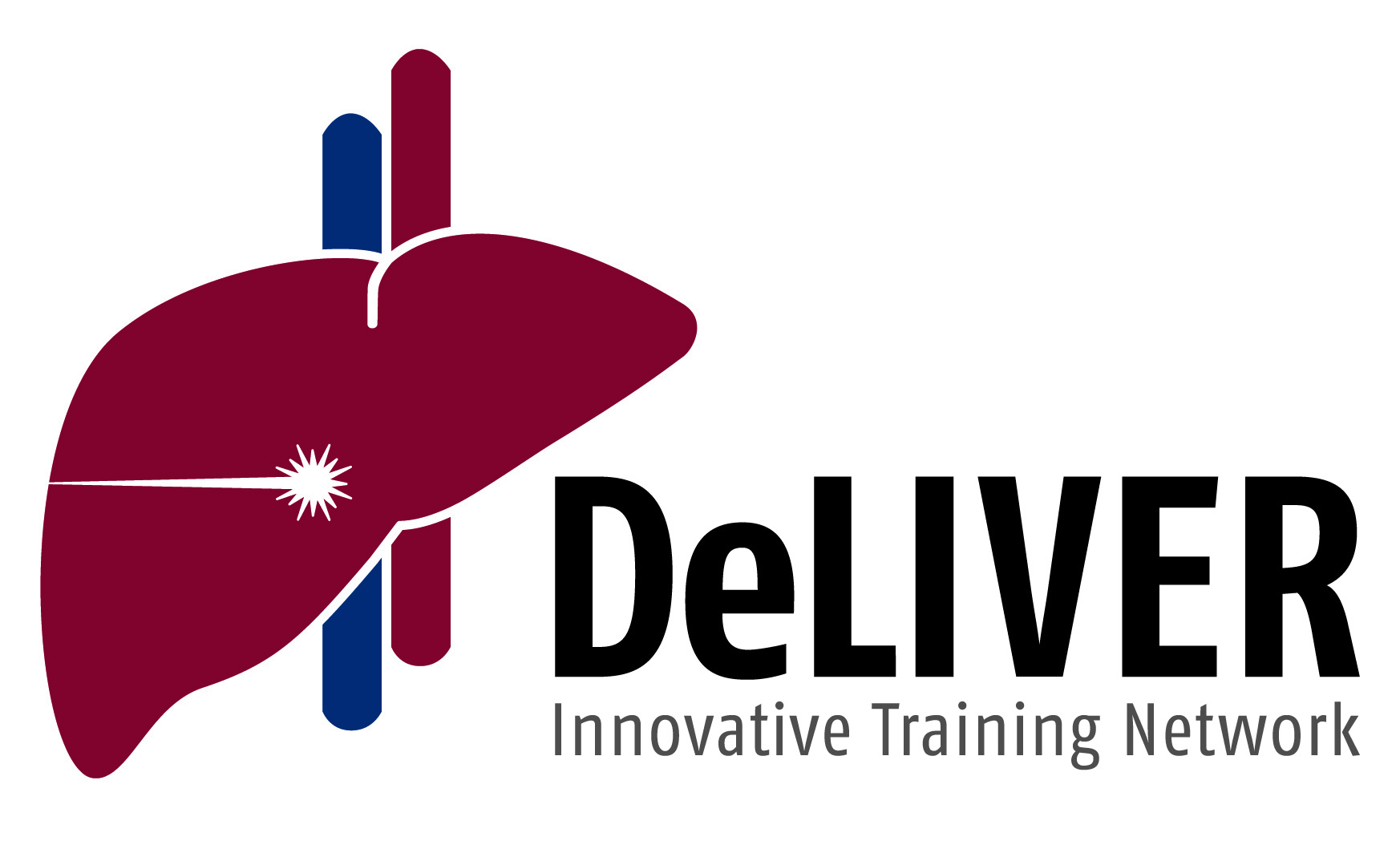DeLIVER is an Innovative Training Network (ITN) funded by the European Union’s Horizon 2020 research and innovation programme under grant agreement No. 766181. The main purpose of DeLIVER is the training of 14 Early Stage Researchers (ESRs) in state of the art biomedical research and imaging methods to further our understanding of the structure and function of cells critical to liver function and healthy ageing. This network comprises a collaborative activity of 6 universities and 3 small and medium sized enterprises across Europe with additional partners from across the world.
 Structured Illumination Microscope (SIM) image
Structured Illumination Microscope (SIM) image
of a triply stained liver sinusoidal endothelial cell (LSEC)
The liver contains a large number of very fine capillaries (the sinusoids), which are lined by endothelial cells. In the liver, these endothelial cells are called liver sinousoidal endothelial cells (LSEC) and the contain thousands of nanosized pores that enable the clearance of molecules and small particles from the blood. The size of these nanopores is well below the optical diffraction limit and consequently, very little is known about the extremely important physiological function of these unique structures and their role in the transfer and/or clearance of metabolites and pharmaceuticals to vital organs. LSEC are also responsible for the removal and degradation of pharmaceuticals, virus and waste macromolecules, making them a highly relevant type of cell for the study of pharmacological drug uptake. Because of the issues mentioned above, however, most pharmaceutical companies currently cannot assess the effect of drugs on these cells.
Novel optical microscopy tools have become available in last few years that now enable for the first time the microscopic study of living cells on the nanoscale and their function.
The key research objectives of DeLIVER are:
- To develop novel high-speed super-resolution optical technologies that transcend the 200nm optical diffraction barrier
- To develop open-access tools for super-resolution optical image reconstruction and blue-prints for high-speed, real-time image reconstruction.
- To extend optical nanoscopy methods to 3D cell culture and in situ tissue studies.
- To obtain mechanistic descriptions of small molecule/pharmaceutical interactions with living LSEC, with liver tissue, and the effect of ageing on this process.
DeLIVER will train a new generation of Early Stage Researchers (ESRs) in the development and application of newly developed high speed and high resolution imaging tools in biomedical research. ESRs will be cross-pollinated with concepts and skills in physics and biomedicine, in particular in super-resolution optical imaging (a.k.a. optical nanoscopy), analytical image reconstruction, and optical micro-manipulation methods. These skills are applied to reveal for the first time the function and dynamics of nanosized pores in endothelial cells (EC) that present the main barrier between the blood and vital organs for human physiology, such as the liver, brain, kidneys, and the eyes. Excellent training in new scientific and complementary skills, combined with international and intersectoral work experience, will instil an innovative, creative and entrepreneurial mind-set in DeLIVER's ESRs, maximising economic benefits based on scientific discoveries. These specialised, highly trained, and mobile ESRs will have greatly enhanced career prospects. The training in novel physical methods with highly relevant experience in the biomedical sciences will allow them to confidently navigate at the interface of academic, clinical and private sector research.
Recent Publications
Select recent papers from the DeLIVER consortium:
- L. Schermelleh, et al., Super-resolution microscopy demystified, Nat. Cell Biol. 21(1), 72-84 (2019)
- C. Øie, et al., New ways of looking at very small holes – using optical nanoscopy to visualize liver sinusoidal endothelial cell fenestrations, Nanophoton.7, 575-596 (2018)
- V. Mönkemöller, et al., Primary rat LSECs preserve their characteristic phenotype after cryopreservation, Sci. Rep.8, 14657 (2018)
Recent News
Coming up: MidTerm Check Meeting in Brussels, April 29, 2019
Other events: - Super-resolution optical fluctuation imaging (SOFI) workshop, ZiF plenary hall, Bielefeld, August 28-30, 2019
- 2nd Network Meeting, Birmingham, United Kingdom, October 2019
- ICON Europe 2020, Jena, Germany, 2020 (several DeLIVER PIs are co-organizers)
This project received funding from the European Union’s Horizon 2020 research and innovation program under the Marie Sklodowska-Curie Grant Agreement No. 766181, project “DeLIVER”.
